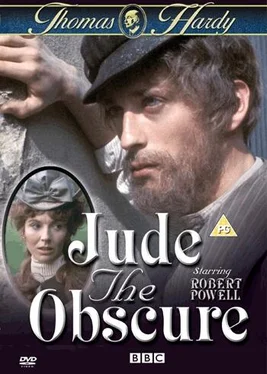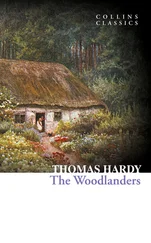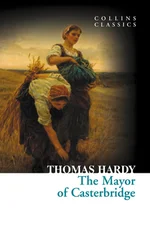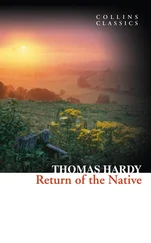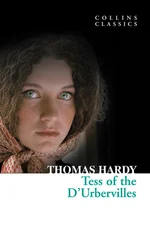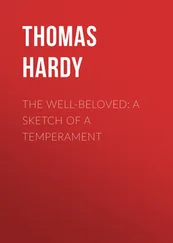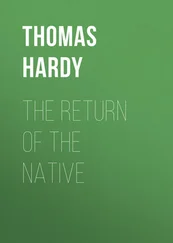"I perceive it won't do to give way to impulse," Phillotson resumed, feeling more and more every minute the necessity of acting up to his position. "I flew in the face of the Church's teaching; but I did it without malice prepense. Women are so strange in their influence that they tempt you to misplaced kindness. However, I know myself better now. A little judicious severity, perhaps…"
"Yes; but you must tighten the reins by degrees only. Don't be too strenuous at first. She'll come to any terms in time."
The caution was unnecessary, though Phillotson did not say so. "I remember what my vicar at Shaston said, when I left after the row that was made about my agreeing to her elopement. 'The only thing you can do to retrieve your position and hers is to admit your error in not restraining her with a wise and strong hand, and to get her back again if she'll come, and be firm in the future.' But I was so headstrong at that time that I paid no heed. And that after the divorce she should have thought of doing so I did not dream."
The gate of Mrs. Edlin's cottage clicked, and somebody began crossing in the direction of the school. Phillotson said "Good-night."
"Oh, is that Mr. Phillotson," said Mrs. Edlin. "I was going over to see 'ee. I've been upstairs with her, helping her to unpack her things; and upon my word, sir, I don't think this ought to be!"
"What—the wedding?"
"Yes. She's forcing herself to it, poor dear little thing; and you've no notion what she's suffering. I was never much for religion nor against it, but it can't be right to let her do this, and you ought to persuade her out of it. Of course everybody will say it was very good and forgiving of 'ee to take her to 'ee again. But for my part I don't."
"It's her wish, and I am willing," said Phillotson with grave reserve, opposition making him illogically tenacious now. "A great piece of laxity will be rectified."
"I don't believe it. She's his wife if anybody's. She's had three children by him, and he loves her dearly; and it's a wicked shame to egg her on to this, poor little quivering thing! She's got nobody on her side. The one man who'd be her friend the obstinate creature won't allow to come near her. What first put her into this mood o' mind, I wonder!"
"I can't tell. Not I certainly. It is all voluntary on her part. Now that's all I have to say." Phillotson spoke stiffly. "You've turned round, Mrs. Edlin. It is unseemly of you!"
"Well. I knowed you'd be affronted at what I had to say; but I don't mind that. The truth's the truth."
"I'm not affronted, Mrs. Edlin. You've been too kind a neighbour for that. But I must be allowed to know what's best for myself and Susanna. I suppose you won't go to church with us, then?"
"No. Be hanged if I can… I don't know what the times be coming to! Matrimony have growed to be that serious in these days that one really do feel afeard to move in it at all. In my time we took it more careless; and I don't know that we was any the worse for it! When I and my poor man were jined in it we kept up the junketing all the week, and drunk the parish dry, and had to borrow half a crown to begin housekeeping!"
When Mrs. Edlin had gone back to her cottage Phillotson spoke moodily. "I don't know whether I ought to do it—at any rate quite so rapidly."
"Why?"
"If she is really compelling herself to this against her instincts—merely from this new sense of duty or religion—I ought perhaps to let her wait a bit."
"Now you've got so far you ought not to back out of it. That's my opinion."
"I can't very well put it off now; that's true. But I had a qualm when she gave that little cry at sight of the licence."
"Now, never you have qualms, old boy. I mean to give her away to-morrow morning, and you mean to take her. It has always been on my conscience that I didn't urge more objections to your letting her go, and now we've got to this stage I shan't be content if I don't help you to set the matter right."
Phillotson nodded, and seeing how staunch his friend was, became more frank. "No doubt when it gets known what I've done I shall be thought a soft fool by many. But they don't know Sue as I do. Though so elusive, hers is such an honest nature at bottom that I don't think she has ever done anything against her conscience. The fact of her having lived with Fawley goes for nothing. At the time she left me for him she thought she was quite within her right. Now she thinks otherwise."
The next morning came, and the self-sacrifice of the woman on the altar of what she was pleased to call her principles was acquiesced in by these two friends, each from his own point of view. Phillotson went across to the Widow Edlin's to fetch Sue a few minutes after eight o'clock. The fog of the previous day or two on the low-lands had travelled up here by now, and the trees on the green caught armfuls, and turned them into showers of big drops. The bride was waiting, ready; bonnet and all on. She had never in her life looked so much like the lily her name connoted as she did in that pallid morning light. Chastened, world-weary, remorseful, the strain on her nerves had preyed upon her flesh and bones, and she appeared smaller in outline than she had formerly done, though Sue had not been a large woman in her days of rudest health.
"Prompt," said the schoolmaster, magnanimously taking her hand. But he checked his impulse to kiss her, remembering her start of yesterday, which unpleasantly lingered in his mind.
Gillingham joined them, and they left the house, Widow Edlin continuing steadfast in her refusal to assist in the ceremony.
"Where is the church?" said Sue. She had not lived there for any length of time since the old church was pulled down, and in her preoccupation forgot the new one.
"Up here," said Phillotson; and presently the tower loomed large and solemn in the fog. The vicar had already crossed to the building, and when they entered he said pleasantly: "We almost want candles."
"You do—wish me to be yours, Richard?" gasped Sue in a whisper.
"Certainly, dear: above all things in the world."
Sue said no more; and for the second or third time he felt he was not quite following out the humane instinct which had induced him to let her go.
There they stood, five altogether: the parson, the clerk, the couple, and Gillingham; and the holy ordinance was resolemnized forthwith. In the nave of the edifice were two or three villagers, and when the clergyman came to the words, "What God hath joined," a woman's voice from among these was heard to utter audibly:
"God hath jined indeed!"
It was like a re-enactment by the ghosts of their former selves of the similar scene which had taken place at Melchester years before. When the books were signed the vicar congratulated the husband and wife on having performed a noble, and righteous, and mutually forgiving act. "All's well that ends well," he said smiling. "May you long be happy together, after thus having been 'saved as by fire.'"
They came down the nearly empty building, and crossed to the schoolhouse. Gillingham wanted to get home that night, and left early. He, too, congratulated the couple. "Now," he said in parting from Phillotson, who walked out a little way, "I shall be able to tell the people in your native place a good round tale; and they'll all say 'Well done,' depend on it."
When the schoolmaster got back Sue was making a pretence of doing some housewifery as if she lived there. But she seemed timid at his approach, and compunction wrought on him at sight of it.
"Of course, my dear, I shan't expect to intrude upon your personal privacy any more than I did before," he said gravely. "It is for our good socially to do this, and that's its justification, if it was not my reason." Sue brightened a little.
Читать дальше
